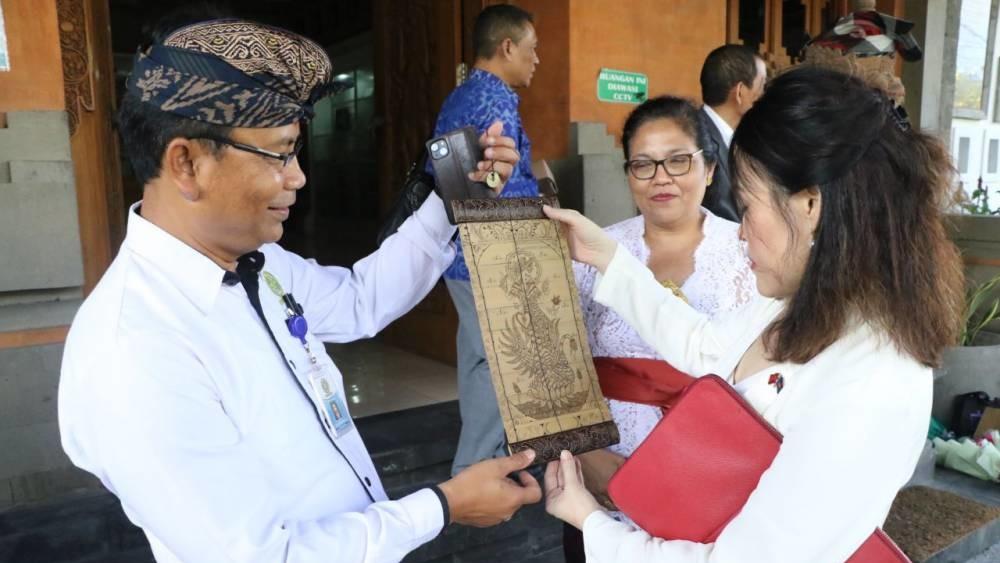 Chinese Ambassador to ASEAN Hou Yanqi addresses a briefing about relations between two sides and the Belt and Road Initiative at her office in Jakarta, Indonesia, Aug 18, 2023. (PHOTO / COURTESY OF CHINA'S MISSION TO ASEAN)
Chinese Ambassador to ASEAN Hou Yanqi addresses a briefing about relations between two sides and the Belt and Road Initiative at her office in Jakarta, Indonesia, Aug 18, 2023. (PHOTO / COURTESY OF CHINA'S MISSION TO ASEAN)
The Belt and Road Initiative is not just about infrastructure development but also refers to people-to-people and cultural exchanges and connectivity, according to Chinese Ambassador to ASEAN Hou Yanqi.
“I have been asked many times what projects are included in the BRI … I think there is some misunderstanding,” Hou said in a press briefing held in Jakarta, while urging the media to help raise public awareness on the BRI.
The three-year old China-ASEAN Cultural Institute aims to support Udayana University’s activities together with universities in China and in ASEAN countries
BRI aims to build a network of connectivity that can help participating countries to attain diversified, independent, balanced and sustainable development. Marking its tenth anniversary this year, BRI has also developed a logistic network that covers 119 countries and regions and has facilitated educational and cultural development by providing scholarships and promoting cultural exchanges.
READ MORE: Belt and Road promoting common development
Hou complimented Indonesia for its work for the region. “Indonesia as chair (of ASEAN) has done a lot of work and has made significant achievements in advancing ASEAN community building and ASEAN-EAS Economic Cooperation,” she said.
As a comprehensive and strategic partner of ASEAN, China has made every effort to support Indonesia’s chairmanship work to promote implementation of President Xi Jinping’s proposal of jointly building a peaceful, safe, secure, prosperous, beautiful and amicable home.
She noted that China has taken a series of practical steps to support ASEAN’s current top priorities, ASEAN Economic Community, and ASEAN-China building of social and cultural community.
Amity between the people holds key in the relation, she said. “China-ASEAN exchange has become more wide ranging, comprehensive and multi-tiered,” she said.
This year a number of provinces, administrative regions and municipalites have sent their delegations to ASEAN countries. Moreover, a large number of departments and State-owned enterprises in various fields have paid visits to ASEAN countries.
“People to people exchange has been rapidly restored and the tourism industry has accelerated its recovery,” the ambassador said, while saying that Southeast Asia tourism is the earliest to recover and has good momentum.
Indonesia is this year’s rotating chair of the regional bloc and will host the 43rd ASEAN Summit in Jakarta early next month. Apart from the ASEAN member countries, leaders from ASEAN’s 10 dialog partners namely China, Japan, South Korea, India, Australia, New Zealand, Canada, the United States and Russia and the European Union – will also attend summit.
 Chinese Ambassador to ASEAN HOU Yanqi (right) visits the China ASEAN Cross Cultural Institute / Faculty of Humanities of Udayana University in July 2023. (PHOTO / COURTESY OF UNUD.AC.ID)
Chinese Ambassador to ASEAN HOU Yanqi (right) visits the China ASEAN Cross Cultural Institute / Faculty of Humanities of Udayana University in July 2023. (PHOTO / COURTESY OF UNUD.AC.ID)
“We have social and cultural diversity and need to build social cohesiveness,” Ardhana told China Daily from the Bali provincial capital of Denpasar. Ardhana is chairman of China-ASEAN Cross-Cultural Institute, which is part of state-owned Udayana University in Denpasar. The university also has Tourism Confucius Institute, whose programs and activities focuses on language trainings and cultural exchanges.
The three-year old China-ASEAN Cultural Institute aims to support Udayana University’s activities together with universities in China and in ASEAN countries. Those activities include joint research, cultural exchanges, language trainings and others like conferences and seminars with various topics.
Ardhana said, “In Bali, China with its culture is viewed as an elder brother. Its (historical) influences are undeniable, like that of other parts of Indonesia and other Southeast Asian countries.” He holds a doctorate degree in Southeast Asia history and culture from Passau University in Germany.
Aleksius Jemadu, lecturer in international relations at Pelita Harapan University in the Western Java province of Bante, said BRI programs and projects require strong legitimacy and social acceptability.
READ MORE: Nation has evolved in the Belt and Road decade; HK must expand role too
Cooperation programs under BRI should not give impression that they are limited to government-to government projects, Jemadu said. “This is part of public diplomacy that must be improved by the two parties when BRI cooperation becomes more and more extensive and increasingly deeper.”
He said BRI programs also focus on the importance of managing differences in various aspects namely social, political and security. This has to be done in a peaceful way and based on mutual trust and respect.
“The higher the bet or the risk of the cooperation, the higher the need for mutual trust,” Jemadu said.
The writer is a freelance journalist for China Daily.


